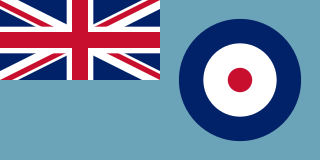This page is based on this
Wikipedia article Text is available under the
CC BY-SA 4.0 license; additional terms may apply.
Images, videos and audio are available under their respective licenses.

Marshal of the Royal Air Force Hugh Montague Trenchard, 1st Viscount Trenchard, was a British officer who was instrumental in establishing the Royal Air Force. He has been described as the Father of the Royal Air Force.

Earl of Rosslyn is a title in the Peerage of the United Kingdom. It was created in 1801 for Alexander Wedderburn, 1st Baron Loughborough, Lord Chancellor from 1793 to 1801, with special remainder to his nephew Sir James St Clair-Erskine, as Wedderburn had no surviving issue of his own. Wedderburn had already been created Baron Loughborough, of Loughborough in the County of Leicester, in the Peerage of Great Britain in 1780, with normal remainder to the heirs male of his body, and Baron Loughborough, of Loughborough in the County of Surrey, in the Peerage of Great Britain in 1795, with the same remainder as the earldom. The 1780 barony became extinct upon his death, but the 1795 barony and the earldom passed, by the special remainder, to his nephew, who thus became the second Earl of Rosslyn. The second Earl was a Lieutenant-General in the Army and also held political office as Lord Privy Seal and Lord President of the Council.

The Chief of the Air Staff (CAS) is the professional head of the Royal Air Force and a member of both the Chiefs of Staff Committee and the Air Force Board. The post was created in 1918 with Major General Sir Hugh Trenchard as the first incumbent. The current and 29th Chief of the Air Staff is Air Chief Marshal Sir Stephen Hillier, who succeeded Sir Andrew Pulford in July 2016.
George Hamilton may refer to:
Acland is an English surname. The Aclands of Devon were an influential family, whose name was derived from Acland near Barnstaple.
Hugh Arbuthnot or Arbuthnott may refer to:
Strachan is a surname of Scottish origin, which may be pronounced 'Strawn' or 'Strak-han'. Notable people with the surname include:

The Barrett-Lennard Baronetcy, of Belhus in the County of Essex, is a title in the Baronetage of the United Kingdom. It was created on 30 June 1801 for Thomas Barrett-Lennard, subsequently Member of Parliament for Essex South. He was the illegitimate son and testamentary heir of Thomas Barrett-Lennard, 17th Baron Dacre. He was succeeded by his grandson, the second Baronet, the son of Thomas Barrett-Lennard, Member of Parliament for Maldon. His son, the third Baronet, was childless and was succeeded by his younger brother, the fourth Baronet. This line of the family failed on the death in 1977 of his son, the fifth Baronet, who died without male issue. The late Baronet was succeeded by his third cousin once removed, the sixth Baronet. He was the son of Sir Fiennes Cecil Arthur Barrett-Lennard, Chief Justice of Jamaica, son of Captain Thomas George Barrett-Lennard, son of the first marriage George Barrett-Lennard, son of John Barrett-Lennard, second son of the first Baronet. The sixth Baronet was a Catholic clergyman. As of 2014 the title is held by his second cousin, the eight Baronet, who succeeded in 2007. He is the grandson of Trenchard Barrett-Lennard, son of the aforementioned George Lennard-Barrett by his second marriage. As of 31 December 2013 the present Baronet has not successfully proven his succession and is therefore not on the Official Roll of the Baronetage, with the baronetcy considered vacant since 2007.
Sir Hugh Arthur Henry Cholmeley, 3rd Baronet DL, JP was a British soldier and politician.
Sir Hugh Dacre Barrett-Lennard, 6th Baronet was a Catholic priest. He previously served in the British Army in the Second World War, being mentioned in dispatches and ending the war as a captain. He became a priest of the London Oratory after the war, where he was noted for his eccentricity.
The Pigot Baronetcy, of Patshull Hall in the County of Stafford, is a title in the Baronetage of Great Britain. It was created on 5 December 1764 for the politician and colonial administrator George Pigot, with remainder to his brothers General Robert Pigot and Admiral Hugh Pigot, and remains extant. On 19 January 1766 Pigot was further honoured when he was raised to the Peerage of Ireland as Baron Pigot, with normal remainder to the heirs male of his body. Lord Pigot was unmarried and on his death in 1777 the barony became extinct. He was succeeded in the baronetcy according to the special remainder by his brother, Robert, the second Baronet. He was a distinguished soldier.
The 1919 Southampton mutiny was a mutiny in the British Army which occurred in January 1919 in the aftermath of World War I. The soldiers, after being misinformed that they were being transported to Southampton to be demobilized, were then ordered to board troop ships for France. The mutiny was brought to an end without bloodshed when General Sir Hugh Trenchard threatened lethal force.
The air commanders of World War I were army or navy officers who came to command air services during the first major conflict in which air power played a significant role.

Hugh Trenchard served as Metropolitan Police Commissioner from 1931 to 1935.
Hugh Trenchard saw service in Nigeria from 1903 to 1910 where he was involved in efforts to bring the interior under settled British rule and quell inter-tribal violence. During his time in West Africa, Trenchard commanded the Southern Nigeria Regiment for several years and was promoted to lieutenant colonel.
Halkett / Halket is a Scottish surname of English (Anglo-Norman) origin. Notable people with the surname include:
George Trenchard is the name of:
Tollemache and also spelled Tallemache or Talmash is an English surname which may refer to:
Sir Maurice Hugh Lowthian Bell, 3rd Baronet was a British soldier.






